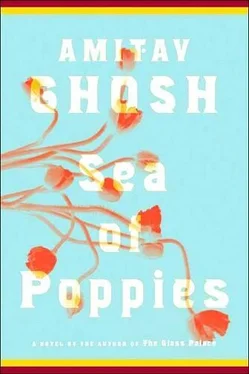Within minutes the maistries were going from hut to hut, swinging their lathis, rooting out those who had shrunk fearfully into corners, and kicking loose the knots of whispering men who were blocking the campsite's paths and doorways. In the women's hut, the prospect of departure caused such a rout that Deeti had to put aside her own fears in order to organize the evacuation: Ratna and Champa could do little but cling to each other; Heeru had prostrated herself on the floor and was rolling from side to side; Sarju, the midwife, had buried her face in her precious bundles and bojhas; Munia could think of nothing but braiding tassels into her hair. Fortunately, Deeti's own bundle of possessions was packed and ready, so she could apply herself fully to the task of organizing the others, prodding, slapping and shouting as was necessary. To such good effect did she apply herself that by the time Kalua appeared in the doorway, every last belonging, the smallest pot and the thinnest shred of cloth, had been accounted for and packed away.
A pile of baggage was clustered around the doorway: picking up her own, Deeti led the women out of the hut with their saris draped carefully over their heads and faces. The women kept close to Kalua's giant frame, as they made their way through the milling migrants. Nearing the jetty, Deeti caught sight of Baboo Nob Kissin: he was in one of the boats, wearing his hair loose so that it fell to his shoulders in shining ringlets. He greeted the women almost as if he were an elder sister, ordering the maistries to let them through first.
When Deeti had crossed the quaking gangplank, the gomusta pointed her to a thatched section at the rear that had been screened off for the women: there was someone already seated inside, but Deeti did not notice her – she had no eyes now but for the pennant-topped temple at the edge of the camp, the sight of which filled her with remorse for her unperformed devotions. No good could come, surely, of a journey embarked upon without a puja? She joined her hands together, closed her eyes, and was soon lost in prayer.
The boat's moving! squealed Munia, and her cry was quickly echoed by another voice, an unfamiliar one: Hã, chal rahe hãi! Yes, we're on our way!
It was only now that Deeti realized that there was a stranger in their midst. Opening her eyes, she saw, sitting opposite her, a woman in a green sari. Deeti's skin began to prickle, as if to tell her that this was someone she had seen before, perhaps in a dream. Seized by curiosity, she pulled her own ghungta back from her head, laying bare her face. We're all women here, she said; ham sabhan merharu . We don't need to be covered up.
Now the stranger too pulled back her sari, revealing a face that was long and finely shaped, with an expression in which innocence was combined with intelligence, sweetness with resolution. Her complexion had a soft, golden glow, like that of the cosseted daughter of a village pandit, a child who had never worked a day in the fields and had never had to endure the heat of the sun.
Where are you travelling to? said Deeti, and such was her sense of familiarity with the stranger, that she had no hesitation in addressing her in her native Bhojpuri.
The girl answered in the bastardized Hindusthani of the city: I'm going where you are going – jahã áp játa…
But you aren't one of us, said Deeti.
I am now, said the girl smiling.
Deeti was not so bold as to ask the girl directly about her identity, so she chose instead the more circuitous course of revealing her own name and those of the others: Munia, Heeru, Sarju, Champa, Ratna and Dookhanee.
I'm called Putleshwari, said the girl in response, and just as everyone was beginning to wonder how they were ever going to pronounce this tongue-tripping Bengali farrago, she rescued them by adding: But my nickname is Pugli, and that's what people call me.
'Pugli?' Why, said Deeti, with a smile. You don't look at all mad.
That's just because you don't know me yet, said the girl, with a sweet smile.
And how is it that you are here with us? Deeti asked.
Baboo Nob Kissin, the gomusta, is my uncle.
Ah! I knew it, said Deeti. You are a bamni , a Brahmin's daughter. But where are you travelling to?
To the island of Mareech, said the girl, just like you.
But you're not a girmitiya, said Deeti. Why would you go to such a place?
My uncle has arranged a marriage for me, said the girl. With a maistry who is working on a plantation.
A marriage? Deeti was amazed to hear her speaking of crossing the sea for a wedding, as if it were no different from going to another village downriver. But aren't you afraid, she said, of losing caste? Of crossing the Black Water, and being on a ship with so many sorts of people?
Not at all, the girl replied, in a tone of unalloyed certainty. On a boat of pilgrims, no one can lose caste and everyone is the same: it's like taking a boat to the temple of Jagannath, in Puri. From now on, and forever afterwards, we will all be ship-siblings – jaházbhais and jaházbahens - to each other. There'll be no differences between us.
This answer was so daring, so ingenious, as fairly to rob the women of their breath. Not in a lifetime of thinking, Deeti knew, would she have stumbled upon an answer so complete, so satisfactory and so thrilling in its possibilities. In the glow of the moment, she did something she would never have done otherwise: she reached out to take the stranger's hand in her own. Instantly, in emulation of her gesture, every other woman reached out too, to share in this communion of touch. Yes, said Deeti, from now on, there are no differences between us; we are jahaz-bhai and jahazbahen to each other; all of us children of the ship.
Somewhere outside, a man's voice was shouting: There she is! The ship – our jahaz…
And there she was, in the distance, with her two masts and her great beak of a bowsprit. It was now that Deeti understood why the image of the vessel had been revealed to her that day, when she stood immersed in the Ganga: it was because her new self, her new life, had been gestating all this while in the belly of this creature, this vessel that was the Mother-Father of her new family, a great wooden mái-báp , an adoptive ancestor and parent of dynasties yet to come: here she was, the Ibis .
*
From his perch on the foremast, high up in the kursi of the crosstrees, Jodu had as fine a view as ever he could have wished: the wharves, the river and the schooner were spread out beneath him like treasure on a moneylender's counter, waiting to be weighed and valued. On deck, the subedar and his men were busy making preparations for the embarkation of the convicts and the migrants. All around them, lascars were swarming about, coiling hansils, rolling bimbas, penning livestock and stowing crates, trying to clear the deck of its last-minute clutter.
The convicts arrived first, preceding the migrants by some fifteen minutes: they came in a jel-bot, a large vessel of the budgerow type, except that all its windows were heavily barred. It looked as if it could hold a small army of cutthroats, so it came as a surprise when it disgorged only two men, neither of whom looked very threatening despite the chains on their ankles and wrists. They were wearing dungaree pyjamas and short-sleeved vests, and each had a lota under one arm and a small cloth bundle in the other. They were handed over to Bhyro Singh without much ceremony, and the jail-boat left almost immediately afterwards. Then, as if to show the convicts what they were in for, the subedar took hold of their chains and herded them along like oxen, prodding them in the arse and occasionally flicking the tips of their ears with his lathi.
Читать дальше












